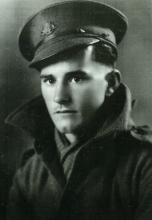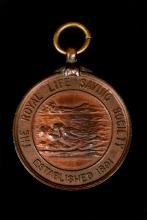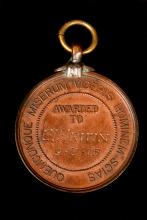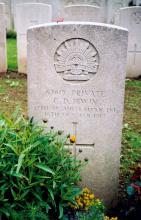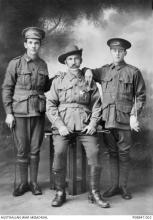Charles Duff Irwin
Charles Duff Irwin, son of Thomas Kennedy Irwin Senior, was one of the Irwin boys who enlisted in the First World War. His father and brothers, Thomas Kennedy Irwin (jnr) and William McIntosh Irwin participated in the war.
Charles was born on 29 March, 1898, in Wollongong, and lived in Campbell Street with his family. Charles attended Wollongong Public school and subsequently worked as a ‘dealer.’ Charles was also a member of the North Wollongong Surf Life Savers, also known as the ‘Water Rats.’
According to the National Australian Archives, Charles Irwin enlisted twice. He initially enlisted on 3 March 1916 and was sent to the AIF 53rd Battalion Depot, Bathurst. He was discharged on 25 April 1916 on the grounds of being ‘medically unfit.’ Reports coinciding with his discharge, state he was in Bathurst Hospital with appendicitis in March 1916.
He enlisted again on 4 October 1916 and was accepted, joining the 13th Battalion 22nd Reinforcements. Charles’ medical examination records state that he had a scar from the appendicitis operation. He embarked on 8 November 1916 from Sydney aboard SS Port Nicholson.
His service ranged from Etaples, Havre as well as Passchendaele where he received shell wounds in both knees and back resulting in the amputation of his left leg at the 10th CCS (Casualty Clearing Station). Charles died of wounds on 16 October 1917; he was only 19 years of age. He is buried at Lijssenthoek Military Cemetery, Poperinge, Belgium: Plot 21, Row 2, Grace E3.
He received the British War and Victory medals as well as a Memorial Scroll and Plaque, all which were sent to his father. He is commemorated at the Australian War Memorial Commemorative Area, panel 69.
An obituary was published in Illawarra Mercury under a roll of honour; many family members had their messages published.
Charles Duff Irwin is commemorated on a number of local memorials including: Wollongong Primary School, City Church (formerly Presbyterian Church), Wollongong War Memorial as well as the North Wollongong Surf Club.
